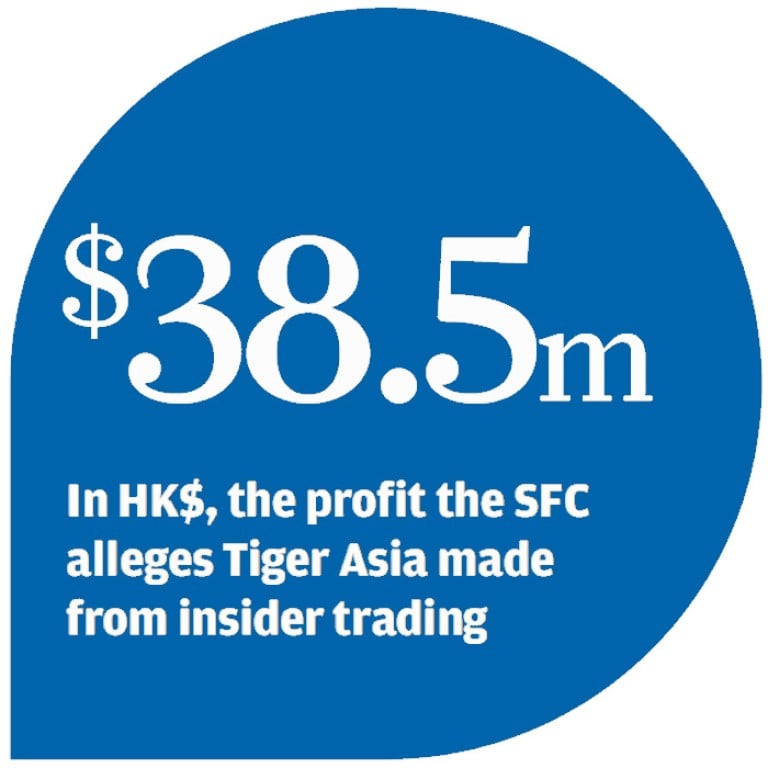
SFC's pursuit of Tiger Asia to continue in courts
Securities and Futures Commission's fight for compensation for Tiger Asia investors goes on
The market regulator may have secured a legal victory in its right to pursue entities deemed to have breached trading rules, but its lawyers are likely to have little time to rest on their laurels.

The court ruling was hailed as a landmark victory for the SFC, which may be a premature call - at least in terms of pursuing redress for investors in its test case.
The SFC now needs to file claims to the Court of First Instance requiring Tiger Asia to compensate investors who made trades in two mainland banks without knowing that placements for each bank would be announced. The commission would still need to present evidence to the court to explain why such claims are valid, and Tiger Asia could fight the claims.
In the written statement, the five-judge panel headed by Chief Justice Geoffrey Ma found the SFC was justified in its legal pursuit of Tiger in its role "as protector of the collective interest of persons dealing in the market".
Legal observers saw the top court's ruling as a landmark decision because it meant similar cases in future would hinge on whether the commission can put evidence directly to the Court of First Instance to seek claims on behalf of investors without a prosecution against the alleged offenders. This is particularly useful when those behind the alleged insider trading offences or other acts of market manipulation are based overseas.
The CFA's statement confirms the regulator's right to sue firms for compensation under Section 213 of the Securities and Futures Ordinance, which the judges deemed to "serve a different purpose from those of a criminal court or the MMT". Additionally, "it provides remedies for damage suffered by parties involved in the impugned transactions", the statement said.
"In these proceedings the SFC acts not as a prosecutor in the general public interest but as protector of the collective interest of persons dealing in the market who have been injured by market misconduct. These are civil proceedings and do not attract the protection accorded to criminal defendants," the statement said.
The top court ruled that under Section 213, the SFC can apply to the Court of First Instance for a declaration that insider dealing or other market misconduct has occurred, and then the court can order the offenders to compensate investors. This is instead of requiring the court to hand down compensation orders depending on the findings of a criminal court or the MMT.
The legal battle began in early 2009 when the commission tried to seek claims from Tiger Asia and banned its three senior executives from trading in Hong Kong. The SFC alleged the New York-based hedge fund committed insider trading and market manipulation by short selling shares of China Construction Bank and Bank of China before the placement announcements, pocketing a profit of HK$38.5 million.
Tiger Asia has no office in Hong Kong, which made it difficult for the SFC to carry out a criminal prosecution or refer it to a trial at the MMT as it could not find witnesses and suspects to attend the hearings.
The SFC turned to Section 213, seeking an order from the Court of First Instance to decide if the SFC allegation was valid for claiming compensation for investors. This benefits the SFC in cases where suspects are not based in Hong Kong, as the court can order compensation payments even without a hearing.
Tiger Asia had won a Court of First Instance ruling in June 2011, when that court found that the SFC must first seek a criminal prosecution or civil inquiry into insider dealing charges before it can sue to recover investors' losses. However, that decision was overturned last year by the Court of Appeal, with an appeals judge saying the regulator could independently seek civil remedies. Tiger Asia then took the case to the Court of Final Appeal, but was again unsuccessful.
Just what the SFC decides to do next, and how Tiger Asia responds, will determine how much further this case has to run.

